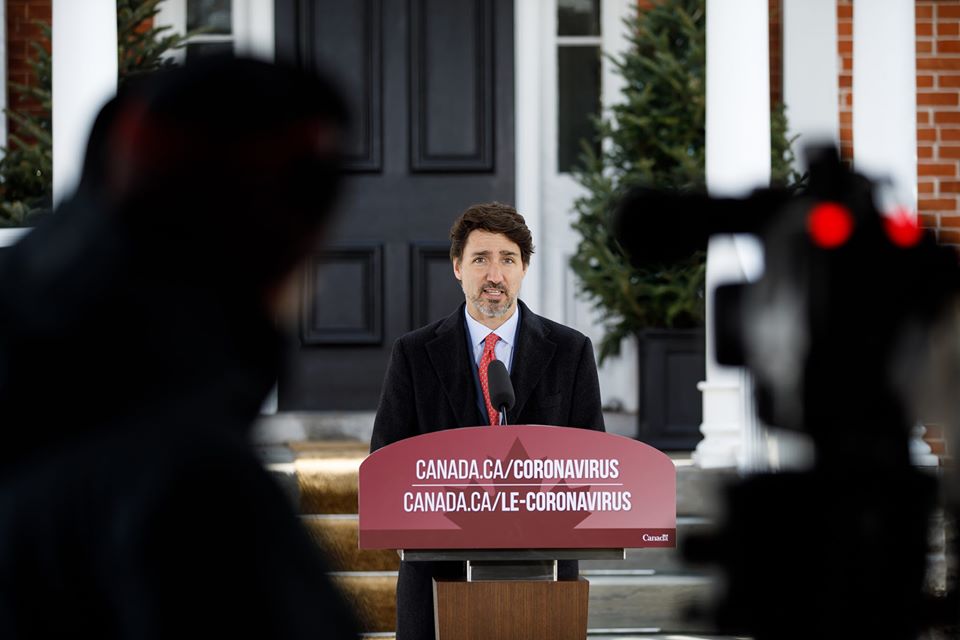Canada News
Trudeau ‘proud’ of Canadian response to COVID 19 as U.S. caseload soars

And while the success or failure of those efforts won’t become clear for at least another week, Trudeau said, there’s little doubt that Canada is doing better than its southern neighbour at limiting the scope of the illness. (File photo: Justin Trudeau/Facebook)
WASHINGTON — As President Donald Trump slowly comes to grips with his country’s grim prognosis for COVID-19, Prime Minister Justin Trudeau conceded Monday he’s taking a measure of comfort from early signs that the caseload in Canada is on a different trajectory than the United States.
Trudeau said he’s proud that Canadians appear to be taking seriously the importance of staying home and keeping their distance from others — the one measure public health officials say is paramount to slowing the spread of the novel coronavirus.
And while the success or failure of those efforts won’t become clear for at least another week, Trudeau said, there’s little doubt that Canada is doing better than its southern neighbour at limiting the scope of the illness.
“I think I would say we’re not necessarily on the same trajectory,” Trudeau said in French during the daily fresh-air briefing outside his Rideau Cottage residence. “We were quicker to get the screening done, and I think we have had more success in getting people to self-isolate.”
The U.S., however, has hardly set a high bar.
There were more than 156,000 cases by midday, nearly 13,000 more than the day before, and the number of deaths was hurtling towards 3,000. A shortage of beds, ventilators and masks had hospitals in hard-hit New York City operating well past the breaking point, using refrigerator trucks as makeshift morgues. The USNS Comfort, a hospital ship, docked at Manhattan’s Pier 90 to help with the overflow.
Alarming spikes in the caseloads in New Jersey, Florida, Pennsylvania and Louisiana had officials in those states bracing for the worst, well aware they might be ill-equipped to handle it. In New Orleans, home to America’s worst per-capita COVID-19 death rate, the mayor said she’d have cancelled Mardi Gras last month if only the federal government had warned her.
Dr. Anthony Fauci, the lead voice of medical reason on the White House coronavirus task force, has warned the U.S. death toll could land between 100,000 and 200,000 — and that’s after Trump abandoned his “aspirational” target of April 12 for reopening parts of the country, extending stay-at-home measures until the end of the month instead.
“By very vigorously following these guidelines, we could save one million American lives,” Trump said Monday during a Rose Garden news conference as he spelled out the need to keep the country shuttered for another month.
“This is our shared patriotic duty; challenging times are ahead for the next 30 days. We’re sort of putting it all on the line, this 30 days.”
To the horror of public health experts, Trump had been musing about a celebratory Easter long weekend marked by packed churches, open shops and an accelerated return to American normalcy, insisting he didn’t want the “cure” to be worse than the “problem.” But early indications from Washington state, which reported the first known U.S. case, suggest the social-distancing strategy is having an impact.
A joint online survey released Monday by polling firm Leger and the Association for Canadian Studies suggested, among other things, a difference in attitudes between the two countries when it comes to modifying behaviour to curb the spread of the virus.
Only 86 per cent of 1,004 U.S. respondents said they were keeping the requisite two-metre distance between themselves and others, compared with 95 per cent of the 1,590 Canadians surveyed, while 85 per cent of the American survey group said they had stopped going out for necessities — nine percentage points less than their northern neighbours.
And while 86 per cent of the Canadians polled said they had asked friends and family to keep their social distance, only 72 per cent of the U.S. respondents could say the same.
“Everything depends on the choices that people have made and continue to make,” Trudeau said.
“I’m very proud of the way that Canadians have rallied and continue to abide by the guidelines. I think they understand that we all have an opportunity to have a direct impact on Canada’s ability to come out of this.”
When confronted with the failings of the American response, Trump frequently claims that things would have been far worse had the U.S. not slammed the door back in late January on travellers from China, where the outbreak originated. Most major airlines by that point had already suspended flights to China.
Canada, however, didn’t take significant steps to restrict international travellers until mid-March. On Monday, Trudeau — asked whether that should have happened earlier — seemed to acknowledge that with the benefit of hindsight, more could have been done.
“We’re obviously not, in an unprecedented situation, always going to get things perfectly right,” he said.
“We’re going to continue to be committed to doing the right things as best as we can and figuring out what works, what doesn’t work, and moving forward in a way that is both nimble and focused on helping Canadians, insomuch as a government can be nimble and agile.”
Canada and the U.S. agreed to close their shared border to non-essential travel two weeks ago while still allowing two-way trade, supply lines and commercial interests to continue, including workers who live in one country but commute to the other. The U.S. has also banned foreign nationals from China, Iran and parts of Europe.
Given U.S. social-distancing restrictions will remain in place through April, those existing travel bans would likely be extended as well, Trump said — “maybe even toughened up a little bit.”





















